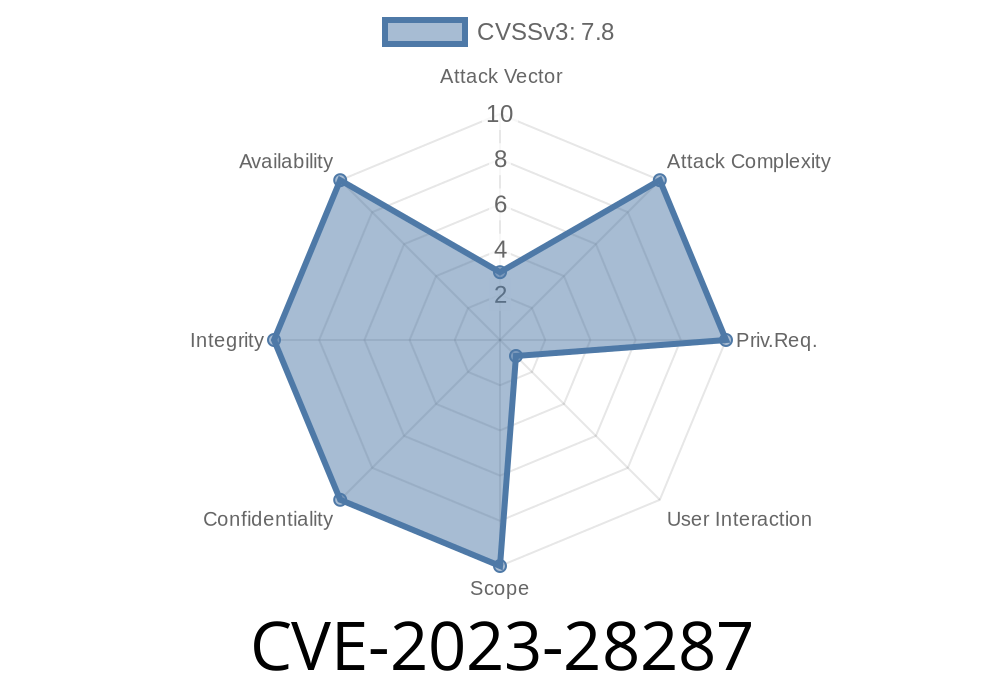When it comes to cyber threats, vulnerabilities in Microsoft Office products always make headlines. In 2023, CVE-2023-28287 stands out as a dangerous bug in Microsoft Publisher that could let attackers run code on your computer. In this post, I’ll break down what happened, how attackers can exploit this, and offer practical advice—all in simple terms.
What is CVE-2023-28287?
CVE-2023-28287 is a Remote Code Execution (RCE) vulnerability found specifically in Microsoft Publisher, a part of the Microsoft Office suite. This bug affects several supported Windows versions and Office releases, putting a lot of home and business users at risk.
RCE means: If an attacker tricks you into opening a specially crafted Publisher (.pub) file, they could potentially run harmful code on your machine with the same rights as you.
How Does CVE-2023-28287 Work?
This vulnerability is all about how Publisher handles untrusted files. If someone sends you a malicious Publisher file and you open it, Publisher might process the file in a way that lets unsafe code slip through and run.
You open the file, thinking it’s safe.
4. Boom—the attacker’s code runs on your computer, maybe installing malware, stealing your passwords, or even taking over your system.
Example Exploit Code
While publishing live exploits is dangerous, I’ll illustrate how a .pub file might exploit such a vulnerability, without sharing anything malicious.
Suppose the exploit abuses embedded links or objects that Publisher fails to process securely.
<!-- publisher file, simplified -->
<PUBDocument>
<EmbeddedObject>
<!-- This part could contain malicious macro or code -->
<ScriptLanguage="VBScript">
<![CDATA[
Set fso = CreateObject("Scripting.FileSystemObject")
Set file = fso.CreateTextFile("C:\Users\Public\exploit.txt", True)
file.WriteLine("You have been hacked!")
file.Close
]]>
</Script>
</EmbeddedObject>
</PUBDocument>
In real exploits, the Publisher file would be much more complex and the payload would be hidden—but the concept is similar.
Exploit Details and Impact
Microsoft’s advisory:
Security news coverage: SecurityWeek article
NVD entry: NIST NVD CVE-2023-28287
According to Microsoft, the vulnerability is "less likely to be exploited" because warnings like Protected View could prevent code from running automatically. However, attackers can sometimes convince users to enable editing, bypassing some protections.
CVSS Score: 7.8 (High)
What could happen?
Install Security Updates
Microsoft patched this bug in their April 2023 Patch Tuesday. Make sure Windows and Office are fully updated.
A good security tool can catch most known malicious files.
Microsoft’s official update guide:
Microsoft Security Update Guide for CVE-2023-28287
Final Thoughts
CVE-2023-28287 shows how dangerous document-based attacks can be. Even a seemingly harmless Publisher file can put your entire PC at risk. Patching is the best defense, but a little caution when handling attachments goes a long way.
Stay safe, keep your software updated, and always be wary of email attachments—especially Publisher files from strangers.
References:
- Official Microsoft Advisory: msrc.microsoft.com/update-guide/vulnerability/CVE-2023-28287
- NVD Details: nvd.nist.gov/vuln/detail/CVE-2023-28287
*This post is for educational purposes only. Never use vulnerability information for illegal activities.*
Timeline
Published on: 06/17/2023 01:15:00 UTC
Last modified on: 06/17/2023 02:32:00 UTC
